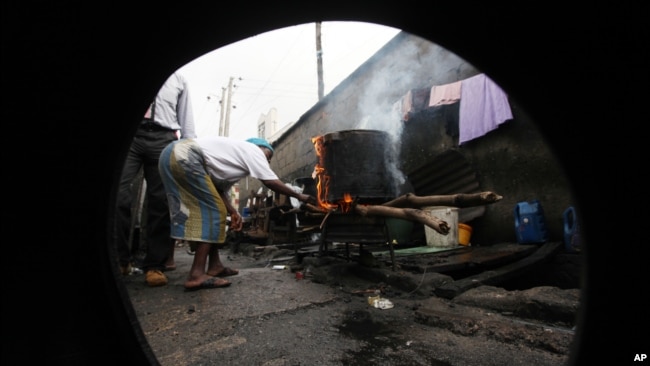逆戻りのナイジェリア燃料事情
政府の二重政策により苦しむ国民。何処も同じ構造にうんざりです。
政界人がみんな同じ思いなら、世界平和がすぐにでも実現できそうですがね?!
VOAで英語を学び、世界を知ろう!!
天然ガスのコスト削減のため、ナイジェリアの人々は薪の使用を余儀なくされている(和訳)
Natural Gas Costs Force Nigerians Back to Wood Cooking Fuel
Lagosラゴスの市場では、Adunni Abdulアドゥンニ・アブドゥルさんが作るmoimoiモイモイと呼ばれる黒目豆を買うために、10年以上もナイジェリア人が列をなしています。
5年前、彼女はLPG(液化石油ガス)を使って葉っぱで調理するようになりました。これなら黒煙が出ません。
薪や木炭を使わないようになったのは、公衆衛生の向上を目的としたキャンペーンがきっかけでした。しかし、ガスの価格が高騰したため、アブドゥルさんをはじめとする多くの人々は、木や炭を燃やして煙を出す生活に戻らざるを得なくなりました。
「ガスは高価なので、私は薪を使っています」と彼女はロイター通信に話ています。彼女は、LPGのおかげで、呼吸が楽になり、料理が早くできるようになったと説明しました。
LPGを燃やすと、木炭に比べて炭素の排出量が約50%少なくなります。また、石油暖房に比べても、二酸化炭素の排出量は20%少なくなっています。薪からガスへの切り替えは、アフリカで最も人口の多い国での二酸化炭素削減計画の中心的な提案です。ナイジェリアには2億人以上の人々が住んでいます。
スコットランドのグラスゴーで開催された国連気候変動会議では、President Muhammadu Buhari ムハマド・ブハリ大統領が、よりクリーンな調理法についてコメントしました。しかし、ナイジェリア最大の都市であるラゴスでは、LPGの価格が過去1年間で60%も上昇しています。ナイジェリアのインフレ率は非常に高く、失業率も上昇しています。
73歳のアブドゥルさんのように、多くの女性が調理場や道端の屋台で何時間も過ごしています。彼女たちは、健康を害したり森林を破壊したりしても、木や炭を燃やすしかないと考えています。
世界LPG協会によると、ナイジェリアのLPG使用量は10年近く増加した後、2020年には増加しませんでした。2018年には、ナイジェリア人の5%が調理にLPGを使用していましたが、73%は木炭や薪などのバイオマスに頼っていました。これは、国連国際エネルギー機関が発表した最新の数字です。
ラゴスの木炭販売業者Jerry Inyangジェリー・イニャンさんは、現在、1日に90パックもの木炭を販売しているといいます。これは昨年の3倍です。また、世界LPG協会によると、LPGの家庭用需要は2020年から減少し始めました。2021年の情報はまだ出ていません。ナイジェリアLPG協会(NLPGA)は、天然ガス利用で得た利益を失う危険性があると述べています。
Felix Ekundayoフェリックス・エクンダヨ氏は、NLPGAの副会長です。同氏によると、エネルギー供給の不足により、米国、欧州、中東のLPGの価格が上昇しているといいます。同氏によると、価格は7年ぶりの高値に近づいており、ナイジェリアの物価上昇の背景にあるといいます。
ナイジェリアは主要な産油国であり、石油輸出国の組織であるOPECに加盟しています。しかし、その石油を処理する産業力がありません。ナイジェリアでは、毎年大量の天然ガスを燃やしています。
Ekundayoエクンダヨー氏によると、同国の通貨価値の下落と、最近追加されたLPG輸入にかかる7.5%の税金が、価格をさらに上昇させているといいます。NLPGAは、政府の金儲けのために追加されたこの税を撤回するよう政府に要求しています。
同時に、ガソリンの補助金は国に何十億ドルもの負担をかけています。エクンダヨー氏は、LPGに課税する一方で、より汚い燃料を支持することは、二酸化炭素を削減するという約束を破ることになると述べています。
「ガスが他の汚い燃料に取って代わる時期に、一貫性のない政策をとっている場合ではない」とエクンダヨ氏は語っています。
Buhari ブハリ大統領と石油省のスポークスマンは、この税金についてコメントしていません。
アブドゥルさんもLPGの価格が緩和されることを望んでいます。薪ストーブの煙が胸を痛めるので、再びガスを使いたいと思っています。「政府に助けてもらって、これを減らしてほしい 」と彼女は話しています。
Natural Gas Costs Force Nigerians Back to Wood Cooking Fuel
Nigerians have been lining up to buy Adunni Abdul's black-eyed peas called moimoi in a market in Lagos for more than 10 years.
Five years ago, she started to cook them in leaves using liquid petroleum gas (LPG). That does not cause a lot of black smoke.
She had stopped using wood and charcoal after a campaign to improve public health. Now, the high prices for gas have forced Abdul and many like her back to burning wood and charcoal and smelling smoke.
"Gas is costly, that is why I am using firewood," she told Reuters. She explained that LPG had helped her breathe more easily and cooked her food faster.
Burning LPG releases around 50 percent less carbon than charcoal. It also releases 20 percent less carbon gasses than heating oil. Switching to the gas from wood is a central proposal for carbon reduction plans in Africa's most populous nation. Nigeria is home to more than 200 million people.
President Muhammadu Buhari commented on cleaner cooking in his recent speech at the United Nations climate meeting in Glasgow, Scotland. But LPG prices have risen by 60 percent over the past year in Nigeria’s biggest city of Lagos. Inflation there is very high and unemployment is rising.
Many women like 73-year-old Abdul spend hours inside cooking areas or at roadside cooking stands. They believe they have no choice but to burn wood or charcoal although it damages their health and harms forests.
Nigeria's LPG use did not increase in 2020 after nearly 10 years of growth, according to the World LPG Association. In 2018, five percent of Nigerians used LPG for cooking while 73 percent depended on charcoal or biomass like wood. Those are the latest numbers from the United Nations International Energy Agency.
Lagos charcoal seller Jerry Inyang said he now sells as many as 90 packs of charcoal a day. Three times the amount last year. Also, household demand for LPG began falling in 2020, according to the World LPG Association. Information for 2021 is not yet available. The Nigeria LPG Association (NLPGA) said the country is at risk of losing the gains it has made in natural gas use.
Felix Ekundayo is deputy president of the NLPGA. He said a lack of energy supplies has led to an increase in prices for U.S., European and Middle Eastern LPG. He said prices are near a seven-year high and are behind Nigeria's rising prices.
Nigeria is a major oil producer and a member of OPEC, the organization for oil-exporting countries. But it lacks the industrial ability to process the oil. Nigeria burns off large amounts of natural gas every year.
Ekundayo said the falling value of the country’s currency and a recently added 7.5 percent tax on LPG imports has increased prices further. The NLPGA has called on the government to withdraw the tax, which was added to make money for the government.
At the same time, gasoline subsidies cost the state billions of dollars. Ekundayo said supporting the dirtier fuel, while taxing LPG, breaks a promise to reduce carbon gasses.
"The time at which gas is displacing other dirty fuel, that is not the time to have inconsistent policy," Ekundayo said.
Spokesmen for Buhari and the Petroleum Ministry did not comment on the tax.
Abdul is also hoping LPG prices ease. The smoke from the wood fire hurts her chest, and she wants to use gas again. "I want the government to help and reduce this," she said.
Words in This Story
charcoal –n. a fuel made from burned wood
subsidy –n. money that is paid usually by a government to keep the price of a product or service low or to help a business or organization to continue
inconsistent –adj. not continuing to happen or develop in the same way
